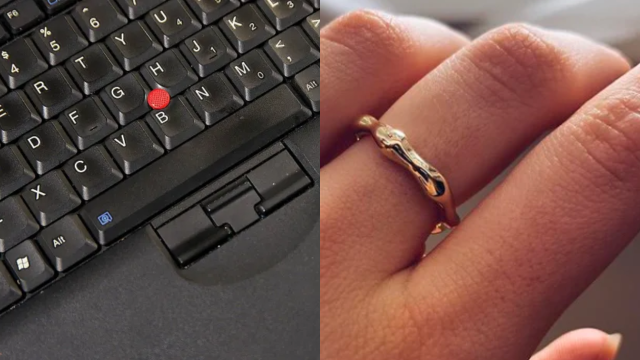Australian designer Holly Ryan is using old laptops to make new jewellery.
It’s a straightforward concept from the outside: laptops boast a tonne of metals, everything from 24-carat gold to platinum and sterling silver, so why not reuse them? But unfortunately, it’s not a common practice.
Ryan has partnered with tech giant Lenovo on what they’re calling an Asset Recovery Service, or ARS. The idea behind it is to provide an end-to-end solution to mitigate the environmental and data security risks associated with end-of-life asset disposal, while maximising the value potential of those assets. In Ryan’s case, it’s taking the metals found inside laptops and melting them down, turning them into jewellery such as rings and earrings.
“It was super exciting to me to have a new way, a new resource, for creating jewellery that isn’t mining,” Ryan said, speaking about Lenovo’s pitch. “It’s important that we’re all really thinking about how our choices impact the future of this beautiful planet and every little choice that you make has impact – what you choose to eat, how you choose to get to work – every single thing has impact. We all really need to be paying attention to that.”
To Ryan, it’s important to use sustainable materials and recycled metals, because “it’s all about circularity”. She said initiatives like the one Lenovo runs are essential, particularly for her, given it’s her goal to not take anything further from the Earth.
“I think that at this point in the discussion surrounding climate change, it is imperative that we all start doing whatever we can to try and reverse the effects of climate change on our beautiful planet,” Ryan said.
“One of the things we can all be doing is recycling things at home, perhaps it’s heirloom jewellery or perhaps it’s the laptop you wrote your thesis on, this is a way for you to become part of the circular process.”
[related_content first=”1779527″]
While Ryan always wanted to be a designer, she didn’t set out to be a jewellery designer.
As she explained, she wanted to make clothes, but soon learned that fashion is the world’s third-largest polluter.
“When you cut a t-shirt pattern out of a piece of fabric, the rest of that fabric is just waste,” she said.
Regardless, she designed a range of clothes for her uni graduate runway show and made some jewellery to accompany those items. Turns out the buyers were more interested in her jewellery than her clothes. That’s why she changed course.
“I really felt pissed off, I guess, at the lack of ability to recycle or upcycle in the fashion sphere so jewellery was the only way to make sense of the design world that I felt was very irresponsible, because to be a designer at all means that you’re going to have impact on the planet somehow,” she said.
“So, if I wanted to be a designer it had to be a responsible one.”
While the initiative Lenovo has that helps her turn laptops into jewellery is great, there’s ample opportunity for more companies to do similar.
“I think all companies really need to be taking a hard look at what assets they might have within their businesses that could be recycled or upcycled and Lenovo is leading the way in this, we all need to be paying attention,” Ryan said.
“Just give a shit people, that’s it.”
